Many dogs have skills and abilities that allow them to assist humans. One familiar and particularly fantastic example is police dogs.
These patrolling pups have been servicing communities for many years as specialty K-9 units.
Note that the role of a police canine varies based on country and municipality, so there’s a wide variety of breeds that can carry out their dignified doggie duties.
We’ll share some of the breeds that are best suited for police work and tell you all about them below!
The Best Police Dog Breeds: Key Takeaways
- Dogs have a number of skills and aptitudes that make them very helpful for law enforcement. Accordingly, police forces have been relying on their help for centuries. Some have been used for scent-detection work, while others have protected their handlers, and still others have performed search-and-rescue tasks.
- Some breeds are especially well-suited for police work and are commonly used in law-enforcement contexts. This includes some of the most familiar K9 breeds, such as Belgian Malinois, German shepherds, and Rottweilers. However, police departments often have varying preferences regarding the breeds they use.
- There are a few surprising breeds that are also used in police work. For example, you may see beagles or Labrador retrievers — two breeds noted for their friendly dispositions — used in some law enforcement roles.
The History of Police Dogs
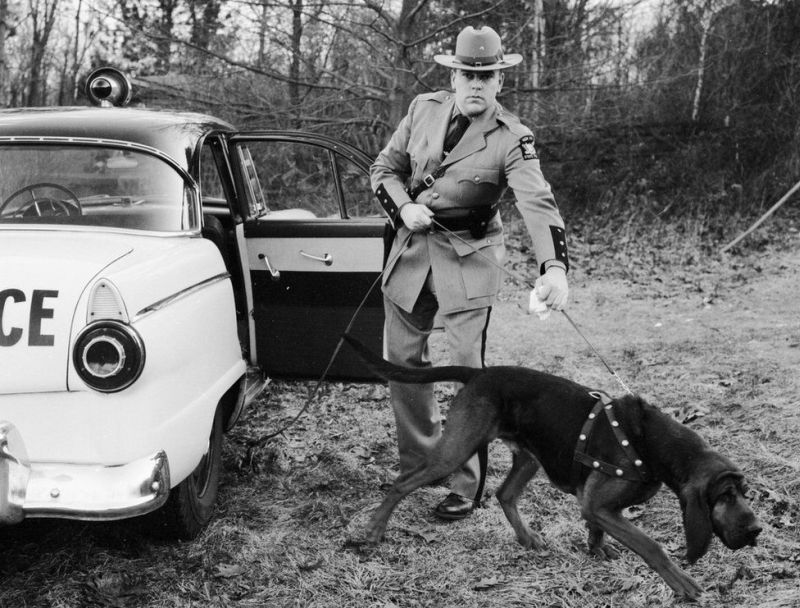
K-9 Police Dogs have been used in law enforcement agencies dating back to the middle ages, as early as the 14th century. In some cases, police dogs were trained to chase down, tackle, and bark on the chest of any suspicious character before the officer arrived at the scene.
However, a more modern model of pooch paw patrol was born when British police dogs were used to track down the notorious Jack the Ripper outside of the metropolitan police station in 1888.
Thanks to their incredible sense of smell, bloodhounds were ideally suited for following the scent left behind by a potential perpetrator. After all, the portion of the canine brain devoted to smell is about 40 times larger than the comparable region of a human police officer.
From then on, bloodhounds continued to accompany law enforcement officers. Over time, more breeds were introduced into the police law enforcement jobs. A law enforcement animal is formally sworn in just like human officers. K-9 officers are highly respected within the community and have additional protected rights while on duty.
Dogs have been involved in law enforcement services in various parts of European countries since the 19th century, and they began accompanying police officers in the United States in the early 20th century. Centers for police dog cadets are fairly common tracing origins in Italy after World War I. Today, dogs in law enforcement can be found across the globe in places like Asian countries in Japan, the vast landscape of Australia, and more.
The scope of work for police dogs expanded over time as well. For example, dogs began engaging in scent detection and patrol work, along with tracking down suspects. Patrol dogs have a completely different set of skills than search and rescue dogs, for instance.
In the modern world, police dogs execute a wide range of duties and are recognized as official law enforcement officers!
What Kinds of Tasks Do Police Dogs Perform?
The role of law enforcement officers is constantly changing and evolving, so it makes sense that dogs in law enforcement perform a variety of tasks. Here are some of the more common activities for police dog service units:
- Drug Sniffing: Dogs have a whopping 225 million scent receptors compared to a human’s 5 million, so it’s no surprise that these competent canines help sniff out drugs and other illicit substances. Police dogs can help with narcotics detection through their super sniffers.
- Explosive Detection: Police pups can also be trained to detect bombs or explosives. Police dogs are also able to access hard to reach areas as an added advantage. Note that dogs specialized in explosive detection are not cross-trained to detect drugs or other substances.
- Other Types of Contraband: The major role of these trained dogs includes sniffing out other types of contraband including exotic animals, food, arms, and more on and off a crime scene. Note that this type of work might not always be with actual police forces but with customs and security workers instead.
- Search and Rescue: Search and rescue dogs (also called SAR dogs) are trained to track down people lost after a natural disaster, in the wilderness, or otherwise. These heroic search and rescue hounds are trained to hone in on a specific scent and follow their noses to complete their mission for any law enforcement agency.
- Patrol: Police dogs can also be trained to monitor and protect a certain area. These patrolling pups can also be trained to protect their handlers or apprehend suspects with verbal or non-verbal cues. These types of police pooches might also assist in crowd control.
What Traits Do Police Dogs Have?
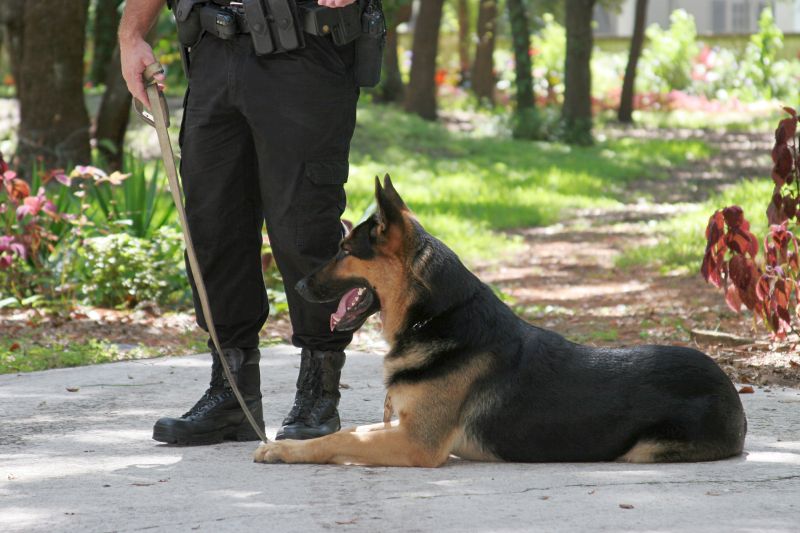
It’s difficult to generalize the traits of police dogs since the roles of law enforcement canines vary. Special dog handlers help identify favorable traits in potential patrolling pups on an individual basis.
However, here are some general traits K-9 trainers take into consideration when evaluating whether or not a particular Fido is fit for police work.
- Intelligence: Popular police dog breeds are highly trainable and willing to follow commands under high-pressure situations. This usually means that dogs used in law enforcement must be exceptionally intelligent so that they can perform their duties without fail.
- Alertness: Working dogs need to be attuned to their surroundings in order to carry out their duties effectively. All police pooches are hardworking hounds who’re ready to spring into action.
- Obedience: Police dogs must be able to listen consistently to their handler’s commands as a vital role of their duties. A dog is more likely to be a good fit for law enforcement if he’s obedient and easily trained.
- Agility: Dogs in law enforcement must be agile and able to navigate a variety of terrain types. They also need to be able to work in tight spaces and other places that humans would have trouble navigating.
- Loyalty: Police dogs must be fiercely loyal to their handlers for the relationship to be a success. A strong bond between a handler and his or her police pooch is key.
- Great Work Ethic: Police dogs are working canines, meaning that they have a different set of needs and routines than a dog who spends all day at home with his family. Accordingly, a main role of police dogs equates to having a strong work drive to keep up with the demands of their everyday activities.
- Strength: A strong, muscular build ensures that police dogs are safe when executing daily duties like patrolling, apprehending suspects, or rescuing trapped individuals. Police dogs must be robust enough to take on the demanding tasks of these types of jobs.
The 13 Best Police Dog Breeds
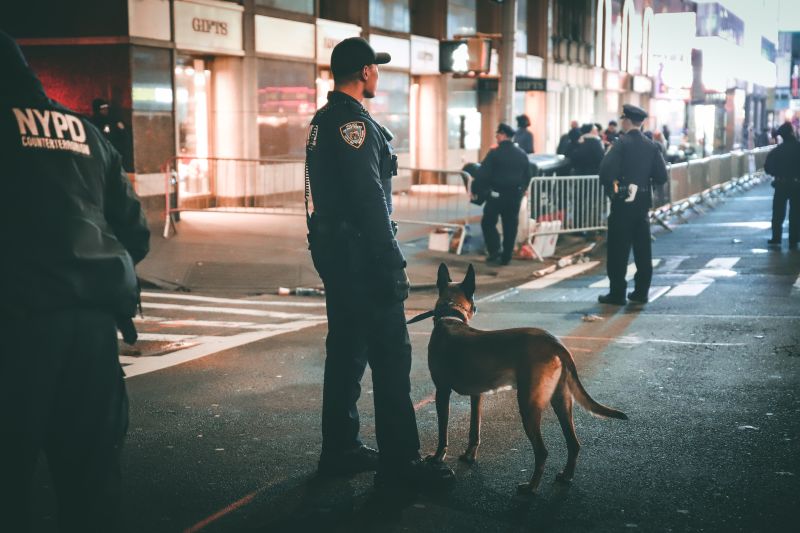
Here are some of the best breeds suited for police station and offsite work. Note that every dog is different and should be evaluated on an individual basis for police work potential, but many of these breeds often make a great choice for police work.
While sourcing a breed that’s historically been used for police work may help, a lot of the skill of police dogs can be directly traced to the quality of their training programs.
This means that a dog’s breed is only part of the equation. Below, we’ll share some of the most common breeds for law enforcement work, but you might see surprising active service dogs in breeds like the English springer or English cocker spaniel, for instance.
1. Belgian Malinois
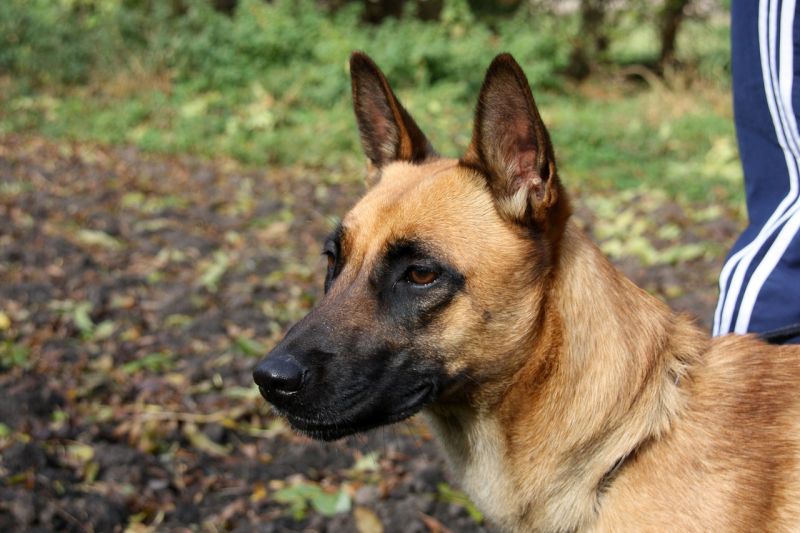
The Belgian Malinois is a confident, hardworking dog with a strong, muscular build. These world-class working dogs help humans with a variety of tasks ranging from herding livestock to performing as excellent guard dogs to working alongside police.
Malinois are commonly compared to German shepherds. But while there are clearly similarities between the two, Malinois are usually a bit smaller than their German counterparts. Belgian Malinois are also a bit more intense and absolutely require a “job” to remain happy — a fact which can make them a poor choice for a family pet.
This breed of police dog has an incredibly strong work ethic and develops a close, loyal bond with his handler. They are also quick learners, who are eager to please their handlers and accomplish the tasks in from of them.
The sharp Belgian Malinois makes an excellent candidate for police work and has become one of the most common breeds used in these roles — both in the U.S. and around the world.
2. German Shepherd
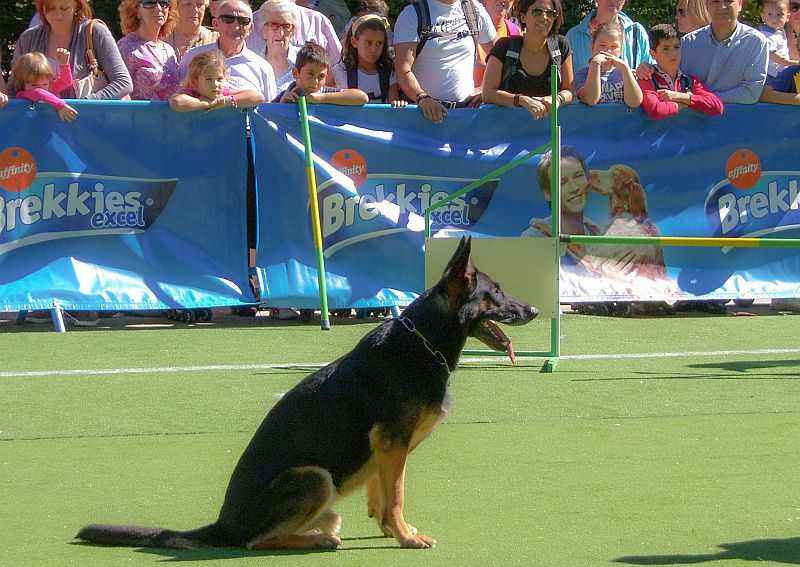
German shepherds and German shepherd mixes are some of the most popular dogs for pet owners and police departments alike due to their loyal and loving nature, as well as their hardworking attitude. These dogs are also highly trainable making them well suited for a variety of police force tasks and specialties.
German shepherd dogs or GSDs are active pups, who love to stay busy and be on their feet (er, paws) throughout the day. These canine cuties usually live anywhere from 10 to 14 years and weigh about 70 to 100 pounds.
This versatile breed can be found in the military, police, at the farm, or even on the big screen. There’s no denying that these highly-trainable canines are great for just about any job you put in front of them for law enforcement purposes. As a common police dog or loyal canine companion, GSDs have heart unlike any other breed.
3. Doberman Pinscher

The Doberman pinscher, affectionately known as the “Dobie,” is a striking, dignified dog that seems like a perfect match for police work based on his proud and intimidating looks alone.
These dogs are also quite loyal, extremely intelligent, and have and eager-to-please demeanor. Dobies are loving and loyal dogs, who are willing to dive into harm’s way if it means protecting those they love or accomplishing their job as a police dog.
As a highly active member of the working group, these dogs need plenty of mental and physical exercise throughout the day. Therefore, work with a police team can be a great fit for these dogs provided they receive adequate training.
4. Labrador Retriever
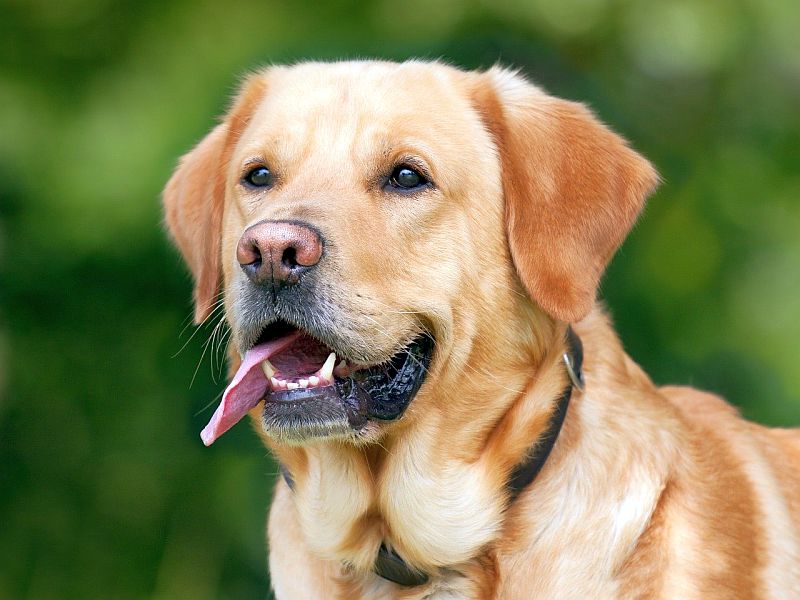
The ever-popular Labrador retriever might not be the first dog that comes to mind when you consider breeds well-suited for the police task force, but his loyal, smart, and trainable nature makes him a surprisingly great pick.
Labrador retrievers are muscular, athletic, and full of energy, allowing them to put in a full day’s work without issue. These dogs also bond closely with their handlers and are eager to please, even when faced with a high-pressure situation.
Additionally, this popular breed has a friendly nature that makes him perfect for working in close quarters with the general public.
Labs usually live 10 to 12 years when well-cared for and fed a nutritious diet. These versatile and intelligent dogs are well-suited for a wide swath of law enforcement duties. But they are usually used in scent-detection or search-and-rescue roles rather than patrol work, like some of the other breeds discussed here.
5. Beagle
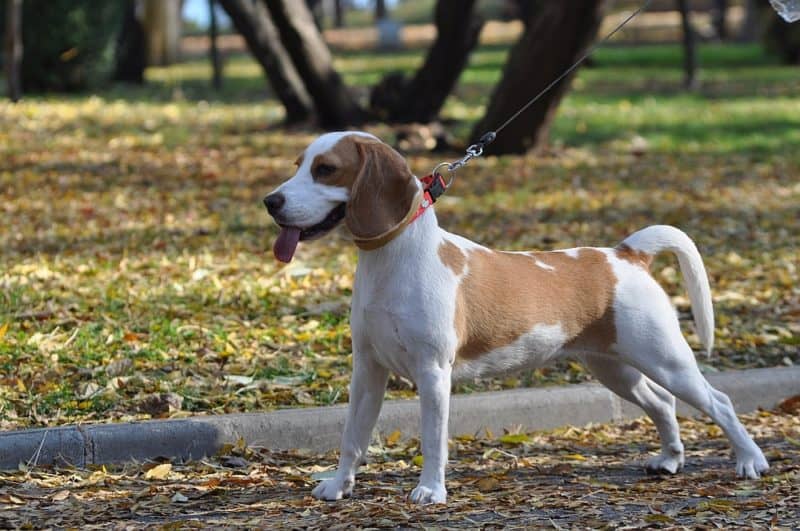
Beagles are one of the many popular dog breeds that also serve as top-notch police pups. A beagle might not be able to take down a fleeing suspect, but these compact canines can still serve as excellent police dogs.
In particular, beagles are a breed with a keen sense of smell making them perfect for scent tracking and detection-based nosework activities.
Their small to medium stature also makes them suited for specialized tasks that would be inappropriate or impossible for larger doggos. These dogs love to keep busy and will enjoy having a daily set of tasks to focus on and stay engaged.
Beagles can occasionally have a stubborn steak or be somewhat of a challenge to train. Therefore, any beagle slated for police work should be evaluated carefully for responsiveness and obedience.
6. Bloodhound
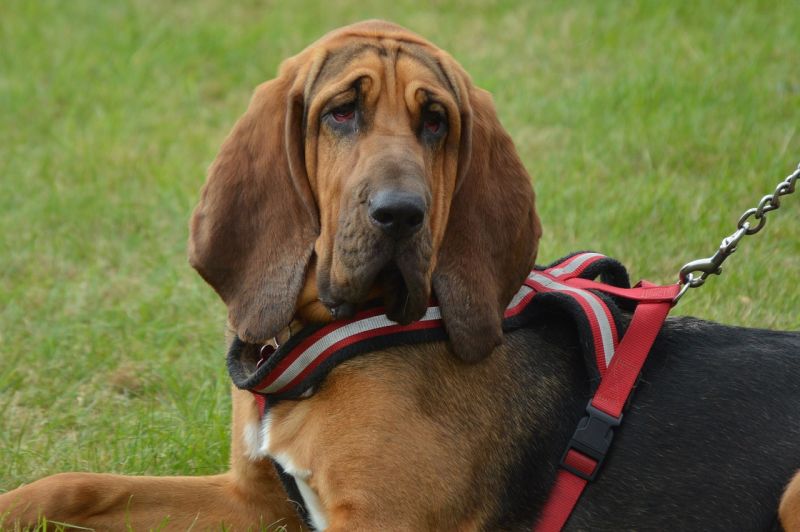
Bloodhounds are one of the first dogs for police work due to their impressive sense of smell. They usually live anywhere from 12 to 15 years and need lots of additional training early on to ensure that they follow their noses when instructed to do so.
These hounds are far from a lazy dog breed and enjoy having a job, making them well suited for roles in K-9 units.
It’s worth noting that these dogs are known for being a challenge to train due to being easily distracted by enticing scents. However, with consistent obedience training, these docile dogs make great detection or search members of law enforcement task forces.
Bloodhounds are large dogs weighing anywhere from 80 to 110 pounds.
7. Rottweiler
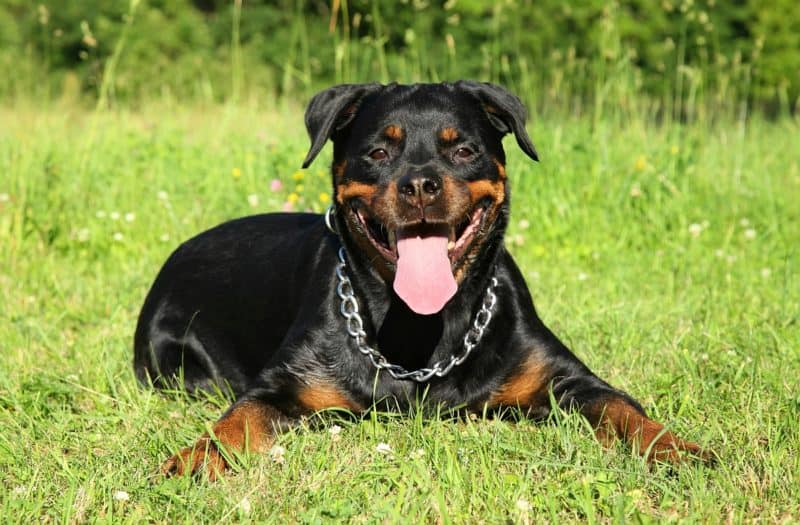
Rottweilers, affectionately referred to as “Rotties,” have a strong, muscular build paired with a courageous, loving heart. These active dogs love to stay busy making police work a potentially great fit for the pups.
These devoted dogs are highly intelligent and eager to please though they do best with consistent training sessions to stay sharp. Rottweilers and Rottweiler mixes have a calm confidence that makes them well suited for executing their duties throughout high-pressure situations.
Rottweilers are super loyal to their handlers or owners, and police officers can count on their Rottweilers to keep them safe while going about their daily duties.
8. Boxers

Boxers have a long history as guard dogs, making them well suited for police work. These intelligent dogs forge strong bonds, and they are also fiercely loyal to their handlers. This also means that boxers require lots of daily mental and physical stimulation, and they love having a set of regular duties.
It’s worth noting that these cute canines have a childlike spirit (and they’re also wonderful with children), which will require consistent, regular training sessions in order to keep their skill set sharp. With an eagerness to please and loyal hearts, these dogs can serve as amazing members of the police force.
These spunky and athletic dogs usually reach ages of 10 to 12 years.
9. Giant Schnauzers
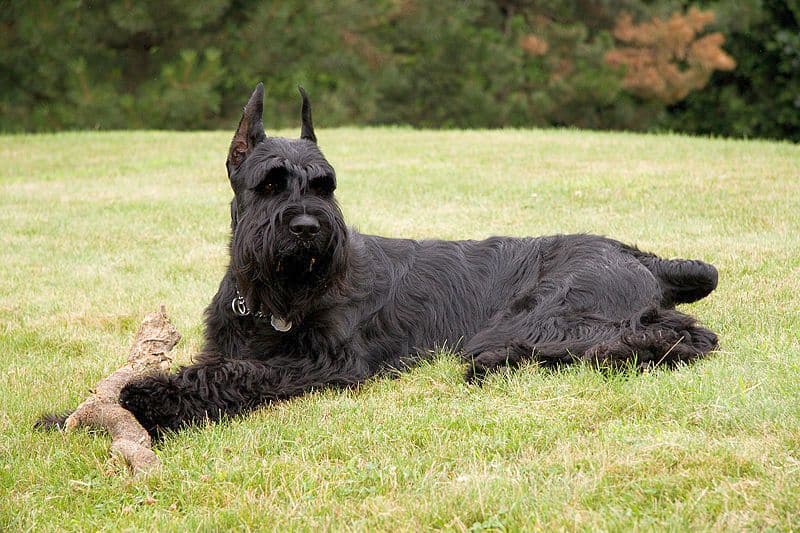
These distinguished working dogs have rugged builds and huge personalities.
A well-trained giant schnauzer finds himself with a wide range of potential jobs from cattle herding to serving as an astute guard dog. This insatiable work drive also makes giant schnauzers unexpected heroes of K-9 units.
Work drive aside, this breed is also known for his intelligence and powerful stature. If you have a giant schnauzer, you know how important it is to keep these big beauties mentally and physically stimulated throughout the day.
These dogs usually live about 10 to 12 years.
10. American Pit Bull Terrier
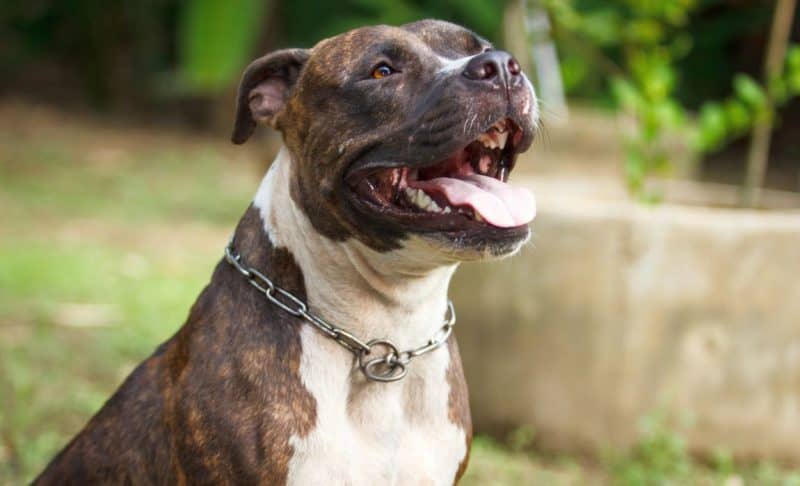
These loyal, loving dogs get a bad rap as being dangerous, but nothing could be further from the truth. These dogs are loving, caring creatures who are eager to please their owners or handlers. With an alert, protective awareness, these loyal pups make great police pals.
The American pit bull terrier is well suited for a variety of police tasks and is highly intelligent. He loves training sessions and will enjoy the mental and physical stimulation that comes from being on the job throughout the day.
These dogs typically live for 12 to 16 years.
11. Briard
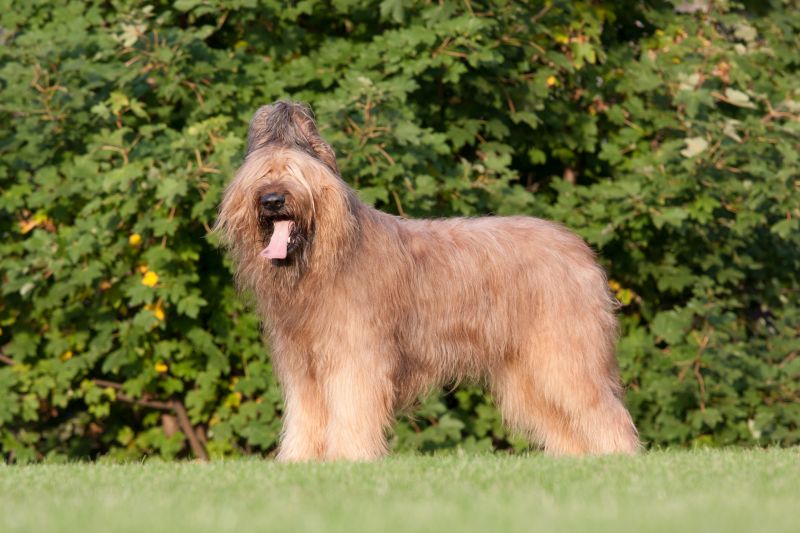
The briard has a long-standing history of being a reliable guard dog, making the breed well-suited for police work. These loyal dogs are highly intelligent making them fairly trainable.
That being said, these dogs can be independent or stubborn to a fault, so it’s imperative that briards are given plenty of time to bond and train with their handlers.
These loving dogs certainly know how to take charge making them great candidates for everyday work. The briard will love assisting you on your everyday activities, as he’s always up for a challenge.
These dogs usually live somewhere between 10 and 12 years.
12. Cane Corso
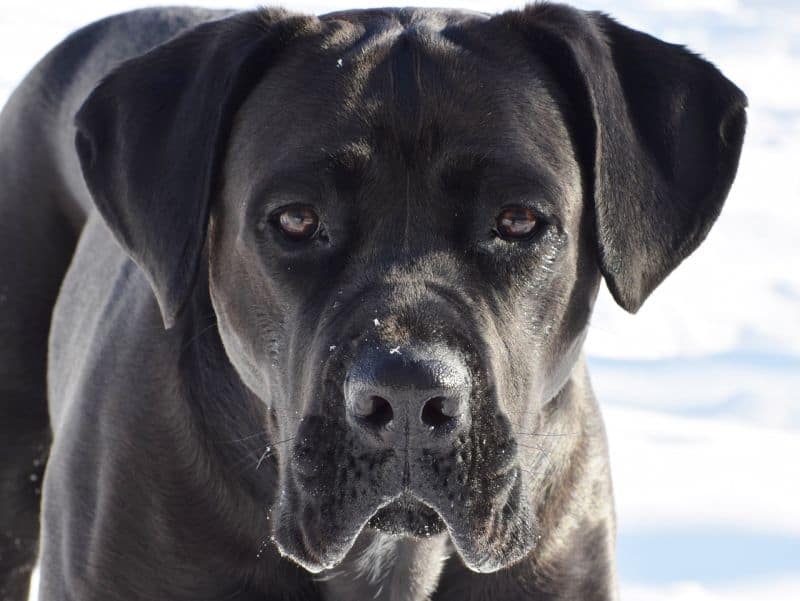
This Italian member of the working dog breed group loves keeping busy, making him a great candidate for regular work at the police department. These large dogs may have a somewhat intimidating appearance, but they’re extremely loving and loyal towards their handlers or family members.
The cane corso is highly intelligent so he has the capacity to pick up new skills quickly. That being said, these dogs can be somewhat stubborn so they’ll need consistent, focused training to thrive.
These dogs love to stay busy and will love putting in long hours.
13. Dutch Shepherd
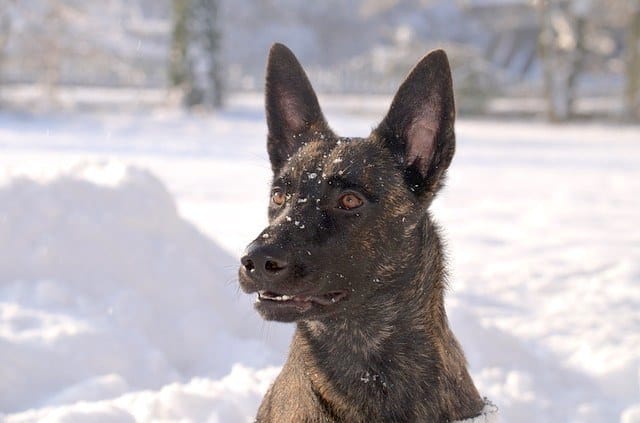
The Dutch shepherd breed is highly trainable making these dogs well suited for work ranging from herding to patrolling the premises. These dogs are known for their excellent watchdog abilities, and they are highly trainable pups.
Dutch shepherds are super active and will enjoy all the mental and physical stimulation that comes with being a part of a K-9 unit. These flexible, healthy canine companions are sure to be valued members of any police department.
Dutch shepherd dogs are closely related to German shepherd dogs and usually live about 12 to 15 years.
Check out 9 of the best dog foods for Dutch shepherds!
How Are Police Dogs Trained?
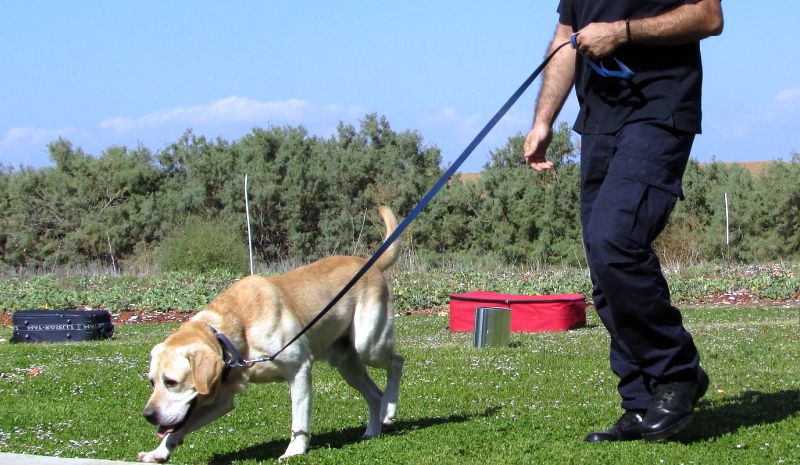
In order to become police dogs, prospective canine candidates must first develop a firm understanding of basic obedience training. This training is usually completed with the help of the dog’s potential handler, to start creating the partnership bond that is crucial to the handler and K-9 unit relationship.
Basic obedience training consists of common commands like sit, stay, come when called, and so on.
A prospective police pooch should be able to follow his handler’s commands without hesitation in a variety of conditions and environments.
If the K-9 in training excels, he then begins specialized training based on his future job.
When it comes to training, police departments have historically subscribed to either the alpha/dominance theory or an R+/positive reinforcement training philosophy.
However, many departments have begun shifting away from the alpha/dominance theory in favor of the R+ or positive reinforcement training method.
Once on the job, police dogs stay with their handlers, even in off-hours to promote a strong bond. Police dogs typically work for anywhere from 7 to 11 years before retiring.
Police Dog Breed FAQs
Are you still hungry for more police pup info? Here are a couple of commonly asked questions and answers surrounding police dog breeds to help!
Which breed makes the best police K9?
The best breed for police work largely depends on the scope of police work a particular pooch will be expected to perform. So, the best breed for search and rescue missions might be entirely different than the breed best suited for detection work. It’s best to evaluate each breed and each dog based on the job itself.
Where do police departments get their dogs?
Police departments may source their dogs from a variety of breeders. These dogs must complete an intense training program through a verified police agency to make sure they’re well suited for the tasks at hand.
Acquiring, training, and handling canine units can be expensive, so it’s not unheard of for police departments to appeal to government agencies to fully or partially cover the expense.
Do police dog handlers live with their dogs?
Police and patrol dog handlers and working canines are considered true partners, so they are in each other’s company most of the time. Generally, police dogs go home with their handlers and live with their handler’s family during off-hours.
How can I train a dog for police work?
Training a pooch for police work can be incredibly tedious, time-consuming, and challenging.
That being said, most police departments opt to train their canine units with the help of a certified trainer or training agency. If you choose to train your dog for police work, you’ll want to consult a trainer or behaviorist to make sure you have a firm understanding of the process and goals of canine unit training.
Are police dogs aggressive?
Police dogs aren’t aggressive, especially when their job is focused on tracking or object detection rather than interaction with others. You might even see incredibly friendly breeds, like golden retrievers, serve as a police dog. That being said, police dogs can be trained to capably protect their handlers.
It’s imperative that police dogs are not pet or interacted with while “on duty” as this may be perceived as a potential threat from the dog’s perspective.
When do police dogs retire?
Active police dogs undergo difficult, often stressful work. That being said, it makes sense that they have a set retirement period after 7 to 11 years of service.
From there, dozens of police dogs are adopted by their handlers, other service members, or loving homes throughout the community. Adoption of police dogs can be another great way to service your community.
Do police dogs wear bulletproof vests?
Police dogs do not always wear bulletproof vests, they are generally reserved for knowingly high-risk situations.
Bulletproof vests for K-9 units can be incredibly expensive, so not all K-9 officers will have access to a bulletproof vest.
***
Dogs can make an invaluable contribution to a police task force. While not all dogs are cut out to be certified canine units, the dogs that do are hardworking heroic hounds.
Is your loyal Lassie destined to be on pooch paw patrol? What’s your favorite police dog breed? We’d love to hear all about it in the comments below.
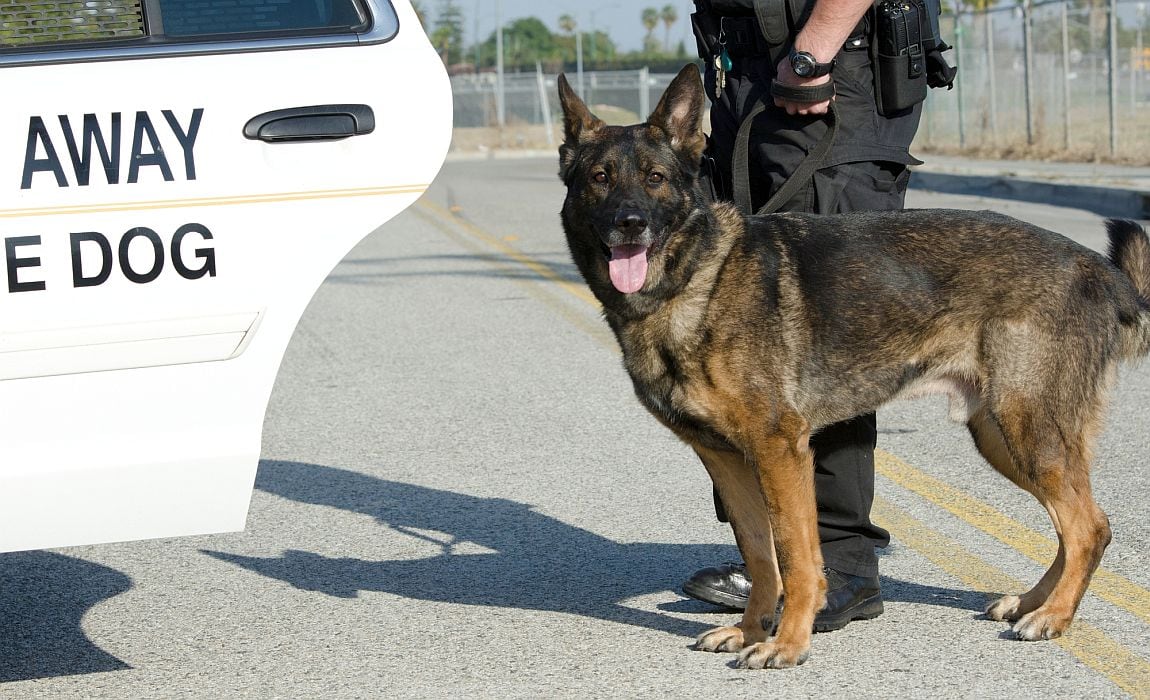

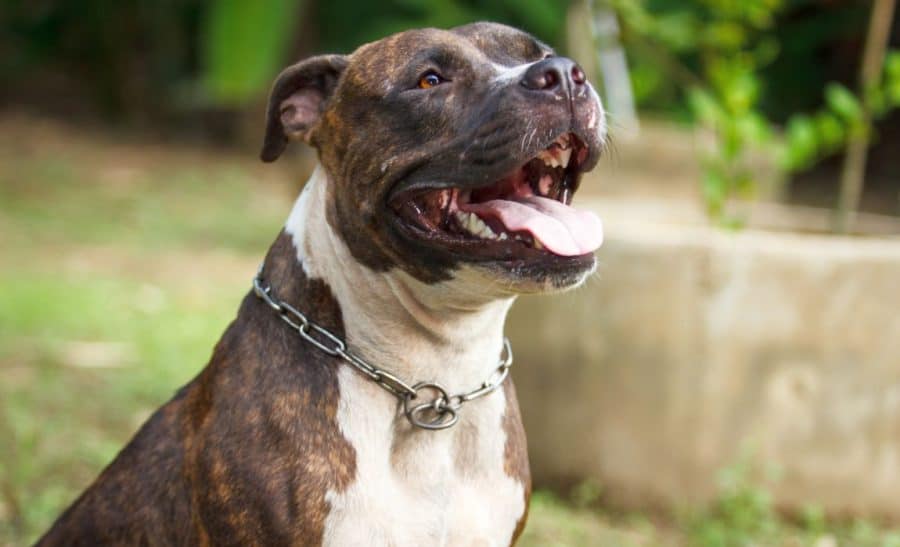


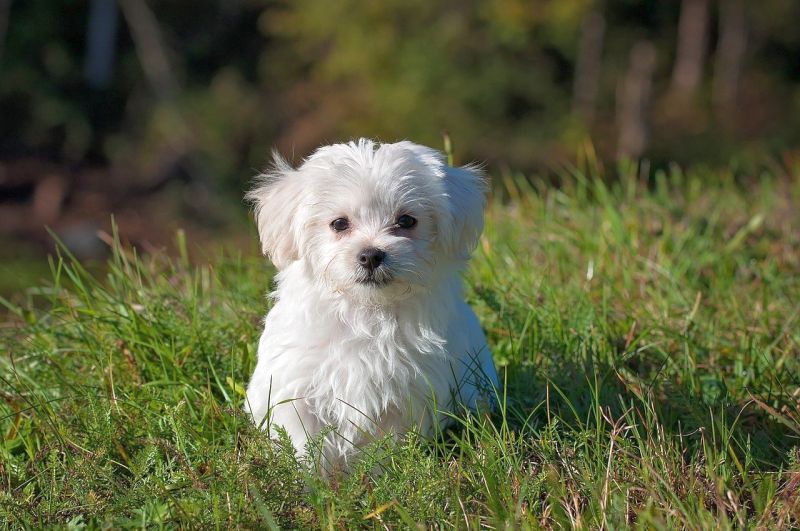

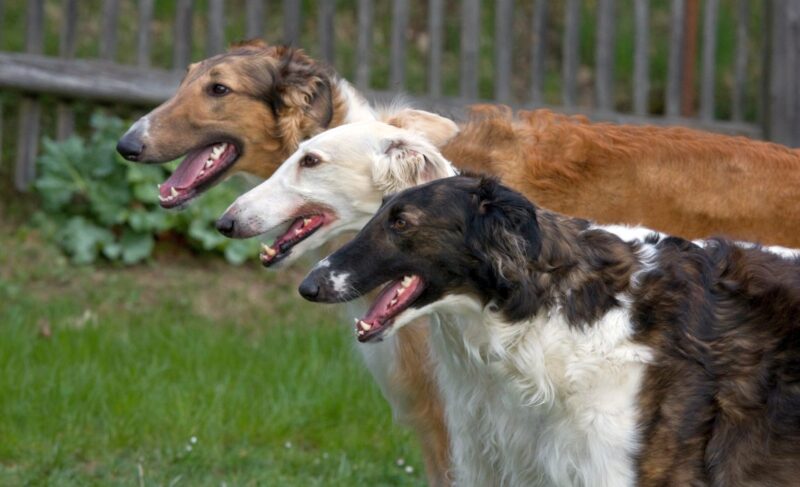
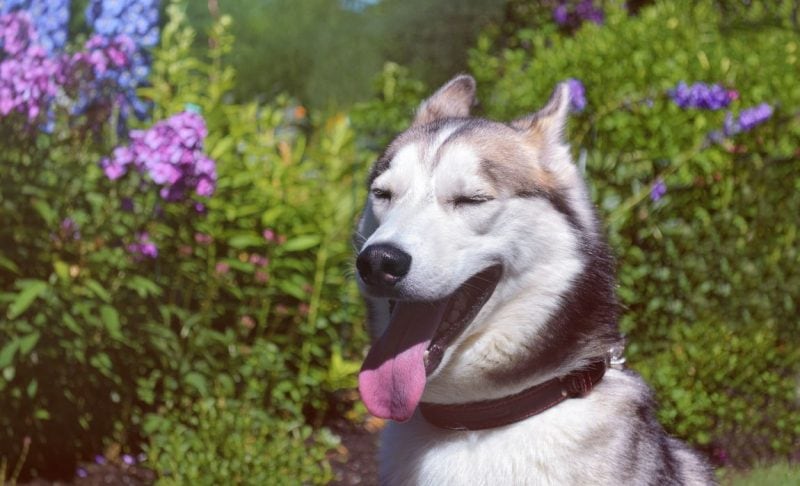

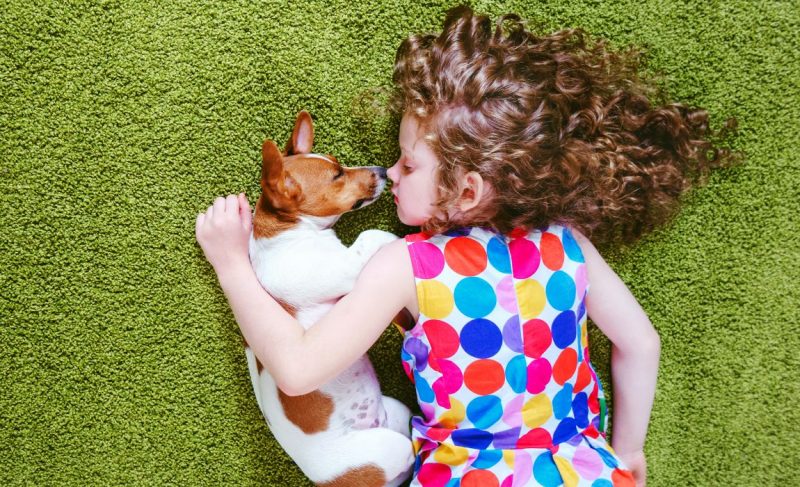
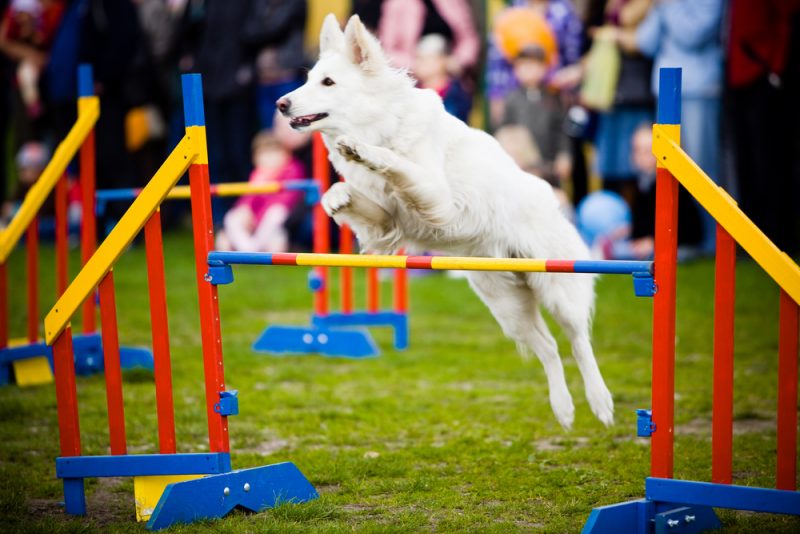

Leave a Comment